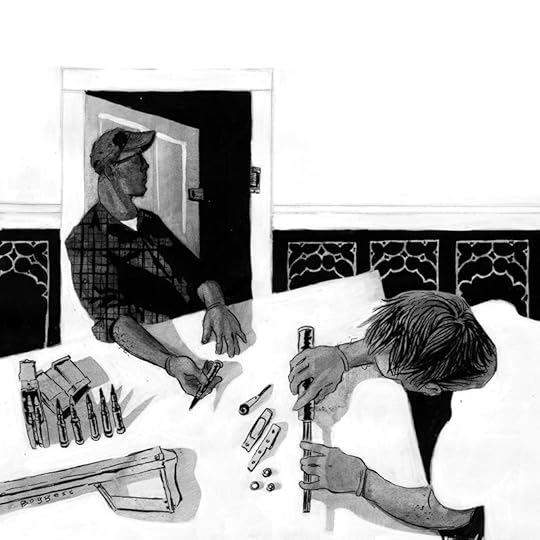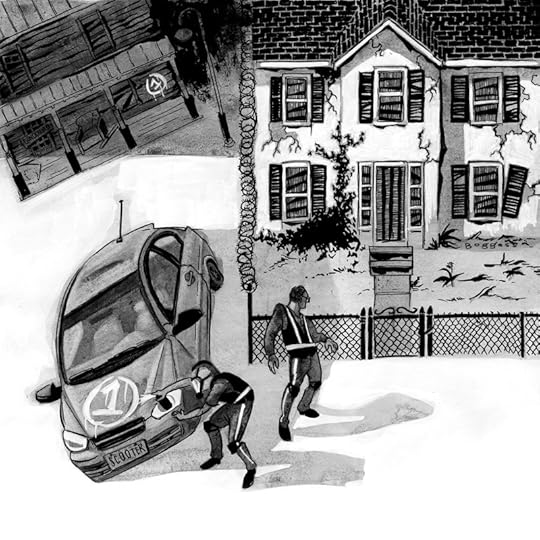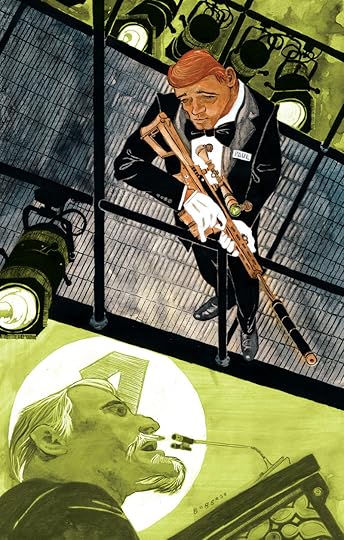Matt Moore's Blog, page 15
October 19, 2012
Community Was Supposed to Premiere Tonight, But…
For Community fans, and yes I am one, tonight was supposed to be the Season 4 premiere.
Then, well… NBC gave us something about shows doing better than expected and “back pockets” and fans following Community to the ends of the earth.
Whatever. At least NBC had the guts to release the following on their YouTube channel to poke a little fun at themselves.

So remember, whenever Community does finally launch Season 4, that will be October 19.
Troy and Abed airing someday!


October 18, 2012
The “Avoid Adverbs” Rule is (Very) Wrong
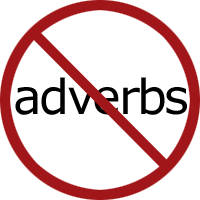
Nope, wrong
As a writer, you’ve heard the “rule” about never using adverbs. This rule is wrong for two reasons:
There is nothing wrong with adverbs.
There are no rules in writing… unless you are a weak writer.
What’s wrong with adverbs?
Not using adverbs is the bastard mutant off-spring of some excellent writing advice: be precise in your wording.
Don’t say “very big”. Say “enormous” or “huge”.
Don’t say “said quietly” but rather “whispered”.
“Very big” is sloppy writing. I agree with that.
I also agree that adverbs can distance the reader or fill in details the reader should be filling in. Mark Landen knocks this idea out of the park in his blog post.
But this does not mean you have to excise an element of grammar. Eliminating adverbs is like eliminating gerunds, adjectives or any grammatical form. That is, there’s a difference between taking issue with weak phrasing that uses adverbs, and eliminating all adverbs just because you think it’s a “rule”.
To say nothing of those shouting “NO ADVERBS!” only target “ly” words. Any word or phrase modifying a verb (or adjective (or adverb)) is an adverb:
Kyle smashed the zombie’s skull until his armed burned and flecks of rotted brain covered the sidewalk.
After surviving the exodus from New York, Lien would never trust another soldier.
Gregor stumbled back, avoiding Ilya’s grasp.
Use adverbs for effect
[image error]
There’s nothing wrong with using an adverb here. The problem is not the adverb. It’s the writer.
While adverbs can distance the reader, they can also have a powerful effect. In a story I just finished, “That Which Does Not Kill You”, I wrote:
It was how she examined and selected the limbs that freaked Teller out. Gently, delicately. Almost lovingly.
By using dry, clinical words like “examined” and “selected” and then contrasting them with three “ly” adverbs, I want to throw the reader off balance.
So, go ahead and use adverbs as long as, like every other word in your story, they add something. But if you rely on them to make up for shortcomings, that’s when there’s a problem. But the problem is not the adverb itself. It’s more complicated than some rule.
What’s wrong with rules
I have found the “no adverbs ” acolytes, who love to slash red ink through every adverb in a manuscript, treat writing like there’s a checklist of what must and must not be in a story. This is weak writing. And weak writers.
As beginners, we seek tips, tricks and techniques to help our writing. It’s a shortcut, a way to become better faster by learning from established writers’ successes and failures. There’s nothing wrong with that. And there’s nothing wrong with a list of things to check for in your stories.

A great book. I learned a lot and highly recommend it. But it’s just advice, not rules.
The trouble is when an established writer’s experience—and then multiple established writers’ experiences—becomes another’s dogma. Rather than finding their own style, they form an amalgam of other writers’ rules, elements, beats and structures. Anything that does not include all of those elements, to them, is bad writing because “So-and-so said you have to…”
For example, a “rule” of writing is don’t have a nameless, faceless protagonist. But my story “Touch the Sky, They Say” has a nameless, genderless character. But not only did I sell it to a SWFA market, it was nominated for an Aurora Award and Editor Helen Michaud pointed it out as .
Writing is art. There are no rules. Grammar, spelling, narrative coherence—you can ignore them and still tell a good story. When talking about “rules,” we’re talking about advice, sign posts, and common elements we find in excellent stories. But there are wonderful stories that break these rules and reject these conventions.
Now, you ignore them at your own peril. Readers (and editors) have certain expectations and breaking them does not make you a genius or original. But there is just as much peril in slavishly following all of these rules. In other words, always consider advice, but use what works and leave aside what does not ring true. You are an artist—trust your intuition. (But be prepared for, and open to, criticism… and rejection.)
Beware the rules & checklist crowd
Don’t be intimidated by those with the checklist of what every story must contain. They don’t understand the difference between “I didn’t enjoy the story because the narration’s adverbs became distracting” and “This story uses adverbs, therefore it is a bad story.” In this second instance, the story taken as a whole might be wonderful, but the checklist crowd can’t get past their iron-clad rules. Consider what they have to say, but don’t take it as gospel.
And sometimes, they wield the checklist just to feel superior. In critiquing their work (or they, yours), they reply: “Well, Vonnegut/VanderMeer/King/Scalzi says __________.” As if quoting some sound byte taken out of context invalidates your opinion.
It’s all advice
In closing, let me say this: All of this is advice. If this doesn’t ring true, don’t do it. I’m one guy and this is what works for me. In the end, we’re all alone with the voices in our head. Listen to them, listen to others, balance the two… it’s your call.
Now get writing (quickly).


September 29, 2012
I Think I’ve Figured Out Why We Love Community… and It’s Disturbing
It wasn’t until the Comedy Network began running Community every night that I saw the pattern. Every episode, in the first season so far at least, revolves around the group seeking Jeff’s approval. Why is this disturbing? Let’s back up.
We all knew a Jeff
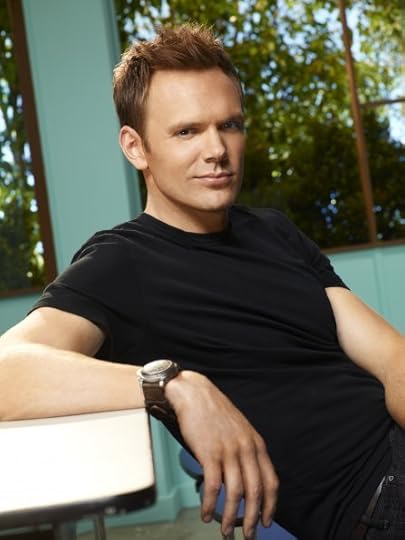
Smug, confident, arrogant. We all knew Jeffs. So why do we like him now?
If you’re reading this, you likely got picked on in high school. But as we got older, we took some comfort in knowing that unlike our bullies, we didn’t peak in high school. Perhaps a bit smugly, we take satisfaction in knowing most of our bullies hit college, and then the real world, not as cool as they used to be. Being a jerk in the closed system of high school can work, but not college. And facing a day job and marriage and kids, being the slick player who looked down on everyone else and felt better about themselves by making someone cry will get you marginalized quite quickly.
But we also know one or two of them are still bullies. College was better than high school, and the real world is their time to shine. The bully who oozes charm, confidence and charisma, and everyone wants to be their friend (and fears being their victim.) Jeff is one of these people. Smart, good looking, successful—Jeff no doubt tormented his peers in high school. And Jeff has admitted he was a bully as a lawyer.
At first, Jeff does not know how not to bully
What makes early episodes of Community interesting is Jeff does not know how to deal with the rest of the group. As a lawyer, he dealt with two kinds of people:
Those not as intelligent as him, so he could outsmart them
Those who were as vain as him, so he could manipulate them through their vanity
Jeff comes from a world without genuine relationships. As a lawyer, his world was about shaping and re-shaping you and those around you to get what you wanted. This is why the study group at first confuses Jeff. They are not out to screw someone else. While not everyone is as smart (Troy) or vain (Abed) as Jeff, they all present characters Jeff does not know how to deal with… except genuinely.
But the group idolizes Jeff
For the group, though, Jeff represents a leader and a protector. And they are desperate for his approval.

Everyone except Britta falls for Jeff… then Britta falls for Jeff.
In early episodes, they (except for Britta) overlook his shortcomings and fete him upon his arrival to the study room. Episode after episode, Jeff breaks down his smug attitudes, embraces true friendship and saves the day. These changes are great character development for Jeff and we grow to admire him for it, but the reason why we love Jeff and how he treats the group is disturbing.
Though relationships become more complex, it boils down to this: The study group wants their own bully to not just protect them, but validate them. We secretly wanted the guy who knocked our books out of our hands or called us horrible names to suddenly say “Hey, you know what? You’re really cool. Let’s hang out.” What’s happening on Community is the good-looking and arrogant cool guy who would normally bully us is giving us approval, and we accept as fact that we do indeed need his approval. That we can change our bullies.
Community is a revenge fantasy?!?!

Kill for us, Jeff Winger! Only you can hold a gun and make it look cool!
So in the end, the reason so many geeks and nerds and outcasts love Community is it is wish fulfillment. While we all had fantasies of violent, bloody retribution raining down on our tormentors, a better revenge is for our bullies to break down, come over to our side and admit the nerds and weirdos actually are cool, the bullies suck, but the traits that made him a bully will now be used for our benefit to torment others.
Still, we do learn more about Jeff’s past (like one member of the study group sent him on his path to being a bully) and come to sympathize with him. However, the group is incomplete without Jeff and all they can talk about is when will he show up when he is absent. As if to say the group cannot exist without Jeff.
I’m not sure that’s a message I can get behind. (But I will keep watching.)
What do you think? Leave me a comment.


September 27, 2012
Social Media Will Change in 2013
It’s a fad…
We’ve all heard that about social media, and eBooks, the Web, television, automobiles, democracy.
Anything that fundamentally changes the status quo, especially for those who are well-established in positions of power with a vested interest in how things are, is called a “fad”. We’ve had experiences (or heard about them) where a silver-haired 50-something boss—who fires off press releases like weapons of war—wearing a suit and tie tells their 20-something employee (wearing jeans and a collared-shirt they feel compelled to wear) that Twitter has no value, to ignore it, that it can’t be taken seriously. Social media is for kids, they say, has no business value and will be gone soon.

Then that 20-something, with 7,000 Twitter followers, vents his frustration to the ether, where it is shared and passed along, all the while secure in the knowledge that his boss will never see these rants (nor understanding the damage he might be doing to the company’s reputation).
Meanwhile, Jetblue continues to receive awards for excellent customer service based on Twitter.
Now, I don’t say this to insult late-Boomers (I wonder what I will consider a “fad” when I am in my 50s), but to state it’s time to conclude social media is not a fad and it is here to stay in one form or another.
Just like the Internet itself.
Social media is mirroring the growth of the Web
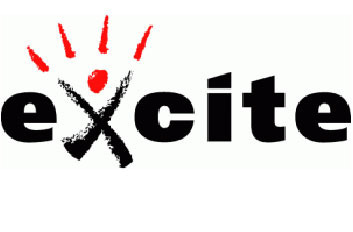 Getting out of university in the mid-90s and going to work in Web Communications, I’ve always compared the current social media growth with the early days of the Web. It started with a few experimental users, caught some media buzz as something “new and different”, and then suddenly it seemed to be everywhere. Companies rose and (sometimes) fell: Google and Facebook, Excite and Friendster, AOL and MySpace.
Getting out of university in the mid-90s and going to work in Web Communications, I’ve always compared the current social media growth with the early days of the Web. It started with a few experimental users, caught some media buzz as something “new and different”, and then suddenly it seemed to be everywhere. Companies rose and (sometimes) fell: Google and Facebook, Excite and Friendster, AOL and MySpace.
A few years ago, before Twitter, Facebook and YouTube were dominant (but on their way), I said it was 1996 all over again. So many ideas, so many companies—all fighting for exposure as well as fans. And, most importantly, these were the pre-commercial days. It was OK to just be cool because people would fund you.
Then we hit 2000 and we had to make money…
But this year things have changed. Twitter is experimenting with advertising models. Facebook, which has been pushing ads at us for a while, wants to push even more. (To say nothing of its IPO falling on its face.) And you can’t watch a YouTube video with moving ads on the page and a video advertisement playing before the video starts.
 It seems we are entering 2000 all over again. Remember that year? Remember Pets.com? If you don’t, monetization flooded the Web in 1999-2000. Everyone was trying to build an online business with the goal of selling something. While some (Amazon.com) nailed it, most failed. The reason was while many of the ideas were cool, people don’t pay for cool. They pay for value. A book they will pay for; access to a news site they might not (because news can be found elsewhere).
It seems we are entering 2000 all over again. Remember that year? Remember Pets.com? If you don’t, monetization flooded the Web in 1999-2000. Everyone was trying to build an online business with the goal of selling something. While some (Amazon.com) nailed it, most failed. The reason was while many of the ideas were cool, people don’t pay for cool. They pay for value. A book they will pay for; access to a news site they might not (because news can be found elsewhere).
Can social media make money?
In the Web 2.0 world, how many more ads will we sit through to watch a video when we can click away to something else? Might more people jump to Google+ when too many tweets from companies urging them to buy something show up in their feed?
Maybe. Or maybe not. We still have banners ads, as annoying and ineffectual as they may be. (But still a big revenue generator for Google.)
But the main thing is the question companies faced twelve years ago: How to turn a popular, cool website into a self-sustaining business? Honestly, aside from advertising, how can Twitter or Facebook make money? Twitter can charge for access to its “firehouse”, but if Twitter or Facebook started charging even $1 per year for access, we would see a mass exodus. (Online, we want it for free.)
If I had the answers, I would be rich, but I think we are at the tipping point where Twitter and Facebook (and others) need to figure it out. Demand is growing, more and more users are signing up, so how can these sites sustain this demand in absense of a massive revenue stream? One idea Twitter has is to allow payment throught tweets, which is intriguing.
My prediction is in 2013 we will find the answer. Either things will change, or things will get shut down.


September 24, 2012
Post-Can*Con Review
Can-Con, Ottawa’s original science fiction convention, has come and gone for another year. And so here is the obligatory post-convention write-up.
Who to thank
First, a huge thanks to my friend and fellow East Block Irregular Derek Kunsken who organized the programming. Hat tip as well to ConComm members—Farrell McGovern, Caycee Price, and Elizabeth Buchan-Kimmerly. (Apologies if I missed someone.)
Thanks also to another EBI member Hayden Trenholm, who was the Author Guest of Honour.
So what happened?
Friday, I didn’t make it to as many panels as I wanted. By the time I got home from work and over to the con (I live in Ottawa), it was getting on 6:30. Then trying to grab a bite to eat at the hotel’s restaurant… well… my apologies to my friends whose panels I wanted to see.
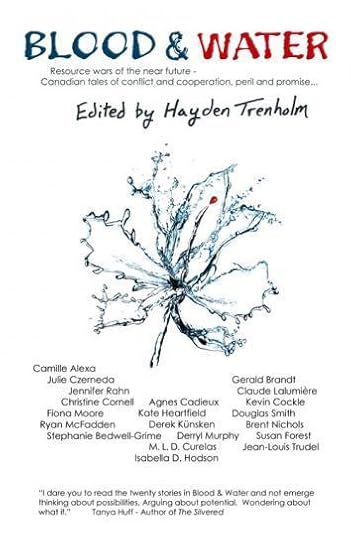 But, I did make it to Hayden’s room party to celebrate the launch of his anthology BLOOD & WATER (Bundoran Press).
But, I did make it to Hayden’s room party to celebrate the launch of his anthology BLOOD & WATER (Bundoran Press).
Saturday started a bit rough. After a late night and fighting a cold, I missed my 10 o’clock panel on writing groups, but had a great time moderating “Horror Reading: What works of horror are scaring the @&%# out of you?” with Ottawa professors Aalya Ahmad and Sean Moreland plus my friends and ChiZine Publications co-publishers Brett Savory and Sandra Kasturi. It was a fabulous talk on both books that are disturbing plus why they work as horror.
Take aways from this panel:
There is a division between fans and academia; there is also a division between hard-core fans—who are jaded and seen it all before—and what most publishers serve up, which is the same old thing. This is because there are always new fans coming to the genre who haven’t see it before.
Meanwhile, hard core fans have to search harder and harder for something new, meaning the niche for “cutting edge” gets more and more narrow.
Horror is an emotion, not a genre. It can be set in the future, the old west, the banality of the everyday. But it must seek to evoke an emotion.
Horror runs a gamut from terror to being grossed out. (Hat tip to Stephen King in Danse Macabre.) Terror is the hardest to evoke, gross-out the easiest.
True horror is the unsettling realization that something is just plain wrong and you can’t figure out why it’s wrong.
Horror is domestic, but not in the sense of it being in the home. Rather, horror must be close. Something horrible happening to a stranger or far away is not as horrible as something happening right in your intimate life.
Horror is about isolation. Virtually every horror story has some element of physical, emotional or personal isolation.
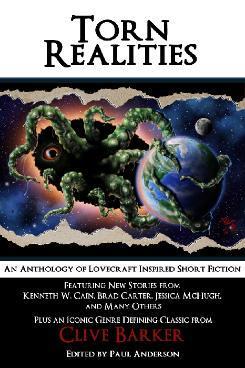 At 3, I read my 2013 Aurora Award-eligible short story “Delta Pi” from TORN REALITIES and then “Touch the Sky, They Say” (AE: The Canadian Science Fiction Review) to fill out my half hour. Ottawa author and friend Matthew Johnson read “Irregular Verbs”, the title story for his upcoming collection from ChiZine Publications (due early 2014).
At 3, I read my 2013 Aurora Award-eligible short story “Delta Pi” from TORN REALITIES and then “Touch the Sky, They Say” (AE: The Canadian Science Fiction Review) to fill out my half hour. Ottawa author and friend Matthew Johnson read “Irregular Verbs”, the title story for his upcoming collection from ChiZine Publications (due early 2014).
Then at 4 came the panel “What should writers aim to get from marketing?” featured Leah Bobet, Marie Bilodeau and Allan Isfan with me as moderator. A great discussion that ranged over a number of topics, some take aways were:
Don’t be a jerk. Seriously, don’t be an asshole.
Be part of a community. But a community is not 20 people standing in a circle yelling at each other.
Network, but don’t sell. Be yourself. Don’t pitch your work. Get to know people and make friends.
Never be dismissive of someone because you think they can’t help you with your career.
Create a personna. You don’t have to share everything, and probably shouldn’t, but be honest in what you are sharing
Your story is a piece of art. Your book is a product to be sold. Understand the difference between artist and professional.
I spent a good deal of the day at the ChiZine Publications dealers room table talking to people about great books. Then off to do shopping for the CZP party, setting up the room and a quick supper.
 Then the party started and it was awesome. Ottawa’s John Park read from his new novel JANUS and Derek Kunsken read a little of his story “To Live and Die in Gibbentow” from IMAGINARIUM 2012.
Then the party started and it was awesome. Ottawa’s John Park read from his new novel JANUS and Derek Kunsken read a little of his story “To Live and Die in Gibbentow” from IMAGINARIUM 2012.
 On Sunday, I moderated a panel on writing Flash Fiction with Marie Bilodeau and Jennifer Michaud. I’d ask Marie and Jennifer to bring pieces of flash fiction to read and Marie surprised me by reading my story “Touch the Sky, They Say.”
On Sunday, I moderated a panel on writing Flash Fiction with Marie Bilodeau and Jennifer Michaud. I’d ask Marie and Jennifer to bring pieces of flash fiction to read and Marie surprised me by reading my story “Touch the Sky, They Say.”
And then it was over.
Wrap-up
Since re-launching in 2010, Can*Con has come a long way. The energy and excitement in the air was great. So many first-time attendees promised to be back. With the Can*Con hosting the Aurora Awards and Canvention next year, it is sure to be even bigger.
So come to Can*Con 2013.
What’s Next
In November, I will be at the World Fantasy Convention and SFContario3, both in Toronto, the first and second weekend of November.


September 15, 2012
My Can-Con 2012 Schedule

I’m thrilled to be a part of Can*Con | The Conference on Canadian Content in Speculative Arts and Literature (Sept. 21-23). It’s Ottawa’s original science fiction convention and this year will feature a strong horror and comic book presence.
Ottawa’s Mirror Comics will have a strong showing. Ottawa professors Sean Moreland and Aalya Ahmad will be promoting their horror anthology Postscripts to Darkness. And my friend and horror writer Lydia Peever (Nightface) will be hitting a few panels.
My friend Derek Kunsken has been busting his butt to put together this year’s programming. Finally locked down, below are the panels I will be sitting on. Odd note: I am moderating every panel I am on. Fear my moderating fury!
If you want to come to Can*Con, you can still register on the Can*Con site.
Saturday, September 22
10AM
OMG! There are 3 scifi/fantasy writers groups in Ottawa! Let’s make more!
Geoff Gander, Matt Moore (m), Leslie Brown, Jennifer Michaud
2PM
Horror Reading: What works of horror are scaring the @&%# out of you?
Aalya Ahmad, Brett Savory, Matt Moore (M), Sandra Kasturi, Sean Moreland
3PM
Reading
I’ll be reading my 2013 Aurora Award-eligible short story “Delta Pi” from Torn Realities.
4PM
What should writers aim to get from marketing?
Matt Moore (m), Leah Bobet, Marie Bilodeau, Allan Isfan
9PM
ChiZine Publications Party
Brett Alexander Savory, Sandra Kasturi, John Park, me and ALL THE COOL PEOPLE!
Sunday, September 23
1PM
Flash Fiction
Matt Moore (m), Marie Bilodeau, Jennifer Michaud
2PM
Marketing Magazines: Audience advice to publishers
Matt Moore (m)
Advice Receivers: Leah Bobet, Paul Jarvey, Allan Isfan


August 29, 2012
We’re halfway to #SixSeasonsAndAMovie
Thanks to Dan Harmon for posting this to Twitter:
Holy crap. Well done. Right in the heart. Three seasons of Community: youtube.com/watch?v=IIQQOP…
—
Dan Harmon (@danharmon) August 29, 2012
I challenge all true Community fans to watch this and not shed a tear. I had been preparing a post about how my writing is not where I want (i.e., need) it to be and my jealousy of those going to WorldCon in Chicago.
But this vid hits me where I live. This is why I love Community. It’s weird, it’s different, it’s extraordinary. Watch, enjoy, celebrate and DEMAND WE GET DAN HARMON BACK!!!
#SixSeasonsAndAMovie, friends. Spread the word.


August 20, 2012
My Sneak-Peak at Can-Con Programming
 I had the chance to see a draft of the programming schedule for Can-Con, Ottawa’s SF/F/H convention taking place September 21-23.
I had the chance to see a draft of the programming schedule for Can-Con, Ottawa’s SF/F/H convention taking place September 21-23.
First, I will say this schedule is the result of a lot of hard work by a lot of people, but I want to single out my friend Derek Künsken, head of programming. I’ve known Derek for 5 years now and together we founded The East Block Irregulars writing group. I’ve always been impressed by his determination and organization, and those qualities have really paid off here.
What can you expect at Can-Con?
The schedule is still in draft form, but what I saw that jumped out at me:
Panels on the specifics of writing science fiction (how to get the science right), horror (what’s scary and what’s a cliché) and fantasy (world-building, languages and maps)
Presentations by scientists and academics
Writers helping other writers when it comes to the business side of things
Fans of genre fiction discussing what they love and would recommend to others
Editors and publishers talking about what they do
Kaffeeklatsches with guests of honor Hayden Trenholm, Alan Neal and Tom Fowler
Readings by authors both local (like me) and from across Canada
Three launch parties (and maybe more!)
A burlesque organized by the Ottawa Browncoats
Who is coming to Can-Con?
Guest of Honour:
Hayden Trenholm
Neal Adams
Tom Folwer
Special Guests:
Marie Bilodeau
Leah Bobbet
Eric Choi
Sandra Kasturi
Brett Savory
I’m very excited by this convention and hope anyone who is reading this in Toronto, Kingston, Montreal or upstate New York will consider making the journey to Ottawa for a weekend of geeky goodness. Cost for the weekend is $50 and registration is open now, including group rates.


August 10, 2012
Two Events this Weekend
Nothing like short notice, right? If you’re in Ottawa and are a fan of sci-fi/horror/fantasy or just great stories, I have two events for you. Hope to see you there!
Postscripts to Darkness 2 Launch
Sean Moreland and Aalya Ahmad, two Ottawa professors studying horror literature who will be attending Can-Con this year, are launching their latest horror anthology Postscripts to Darkness 2.
When & Where:
Imperial Pub
329 Bank Street
Ottawa
Saturday, August 11 @ 7PM
Can-Con Reading Club: Online ‘Zines
As part of the warm-up for Can-Con, the organizers are hosting reading series to cover various topics. This Sunday afternoon we will be covering 4 stories in the online ‘zines AE: The Canadian Science Fiction Review and Ideomancer. One of the stories to be discussed is my story “Ascension“. The others are:
“Chrestomathy” by Anatoly Belilovsky
“Convent Geometry” by Georgina Bruce
“The Death Collector” by Silvia Moreno-Garcia
I should point out AE editor Duff McCourt and Ideomancer editor Leah Bobbet will be attending Can-Con in September.
When & Where:
Bridgehead Coffeehouse
Bank & Albert
Ottawa
Sunday, August 12 @ 2PM


July 18, 2012
Artwork by Jared Boggess for “In the Shadow of Scythe”
Even though he posted them back in April, I just found Jared Boggess’ artwork for my story “In the Shadow of Scythe” posted on his Tumblr blog Illusions of Grandeur. (“In the Shadow of Scythe” appears in issue #62 of Leading Edge Magazine.)
It’s easy for an author to say he likes artwork in an effort to promote his work. Well, I don’t like this artwork. I f**king love it! It combines gritty realism with enough abstraction to convey the emotion of the story.
“In the Shadow of Scythe” could be the most grueling story I’ve written since Silverman’s Game. Where Silverman’s Game has characters suffering at the hands of someone else, ”In the Shadow of Scythe” has a man named Archie walking through the valley of the shadow of death by his own choice. But he’s there because he walked through hell and doesn’t know another way anymore.
Jared has captured this, especially with the third picture above, showing the scene that is the emotional crux of the story.
I am so thrilled by this art and invite you all to check out Jared’s work on:
His website
Facebook page
Tumblr
And to Jared: Thank you, brother! Hope we can cross paths sometime. Beers on me.



